latest updated documents, correct, verified & graded A study materials
get bundles, documents, test banks, case studies, shadow health's, ATIs, HESIs, study guides, summary, assignments & every kind of study materials.
- 14300
- 0
- 1062
Community
- Followers
- Following
683 Reviews received
15406 items
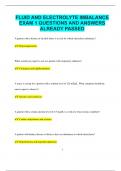
FLUID AND ELECTROLYTE IMBALANCE EXAM 1 QUESTIONS AND ANSWERS ALREADY PASSED
FLUID AND ELECTROLYTE IMBALANCE EXAM 1 QUESTIONS AND ANSWERS ALREADY PASSED A patient with a history of alcohol abuse is at risk for which electrolyte imbalance? Hypomagnesemia What would you expect to see in a patient with respiratory alkalosis? Tachypnea and lightheadedness A nurse is caring for a patient with a sodium level of 120 mEq/L. What symptom should the nurse expect to observe? Seizures and confusion A patient with a serum calcium level of 4.5 mg/dL is at risk f...
- Package deal
- Exam (elaborations)
- • 58 pages •
FLUID AND ELECTROLYTE IMBALANCE EXAM 1 QUESTIONS AND ANSWERS ALREADY PASSED A patient with a history of alcohol abuse is at risk for which electrolyte imbalance? Hypomagnesemia What would you expect to see in a patient with respiratory alkalosis? Tachypnea and lightheadedness A nurse is caring for a patient with a sodium level of 120 mEq/L. What symptom should the nurse expect to observe? Seizures and confusion A patient with a serum calcium level of 4.5 mg/dL is at risk f...
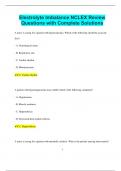
Electrolyte Imbalance NCLEX Review Questions with Complete Solutions
Electrolyte Imbalance NCLEX Review Questions with Complete Solutions A nurse is caring for a patient with hypercalcemia. Which of the following should be assessed first? - A. Neurological status - B. Respiratory rate - C. Cardiac rhythm - D. Blood pressure C. Cardiac rhythm A patient with hypomagnesemia may exhibit which of the following symptoms? - A. Hypotension - B. Muscle weakness - C. Hyperreflexia - D. Decreased deep tendon reflexes C. Hyperreflexia A nurse is caring...
- Package deal
- Exam (elaborations)
- • 12 pages •
Electrolyte Imbalance NCLEX Review Questions with Complete Solutions A nurse is caring for a patient with hypercalcemia. Which of the following should be assessed first? - A. Neurological status - B. Respiratory rate - C. Cardiac rhythm - D. Blood pressure C. Cardiac rhythm A patient with hypomagnesemia may exhibit which of the following symptoms? - A. Hypotension - B. Muscle weakness - C. Hyperreflexia - D. Decreased deep tendon reflexes C. Hyperreflexia A nurse is caring...
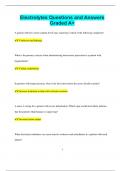
Electrolytes Questions and Answers Graded A+
Electrolytes Questions and Answers Graded A+ A patient with low serum sodium levels may experience which of the following symptoms? Confusion and lethargy What is the primary concern when administering intravenous potassium to a patient with hypokalemia? Cardiac arrhythmias In patients with hypercalcemia, what is the first intervention the nurse should consider? Increase hydration to help with calcium excretion A nurse is caring for a patient with severe dehydration. Which ...
- Package deal
- Exam (elaborations)
- • 15 pages •
Electrolytes Questions and Answers Graded A+ A patient with low serum sodium levels may experience which of the following symptoms? Confusion and lethargy What is the primary concern when administering intravenous potassium to a patient with hypokalemia? Cardiac arrhythmias In patients with hypercalcemia, what is the first intervention the nurse should consider? Increase hydration to help with calcium excretion A nurse is caring for a patient with severe dehydration. Which ...
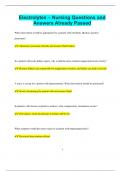
Electrolytes – Nursing Questions and Answers Already Passed
Electrolytes – Nursing Questions and Answers Already Passed What intervention would be appropriate for a patient with metabolic alkalosis and low potassium? Administer potassium chloride and monitor fluid balance In a patient with acute kidney injury, why would the nurse monitor magnesium levels closely? Because kidneys are responsible for magnesium excretion, and failure can lead to toxicity A nurse is caring for a patient with hypernatremia. What intervention should be prior...
- Package deal
- Exam (elaborations)
- • 26 pages •
Electrolytes – Nursing Questions and Answers Already Passed What intervention would be appropriate for a patient with metabolic alkalosis and low potassium? Administer potassium chloride and monitor fluid balance In a patient with acute kidney injury, why would the nurse monitor magnesium levels closely? Because kidneys are responsible for magnesium excretion, and failure can lead to toxicity A nurse is caring for a patient with hypernatremia. What intervention should be prior...
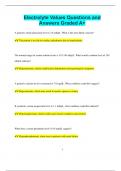
Electrolyte Values Questions and Answers Graded A+
Electrolyte Values Questions and Answers Graded A+ A patient's serum potassium level is 2.8 mEq/L. What is the most likely concern? The patient is at risk for cardiac arrhythmias due to hypokalemia The normal range for serum sodium levels is 135-145 mEq/L. What would a sodium level of 150 mEq/L indicate? Hypernatremia, which could lead to dehydration and neurological symptoms A patient's calcium level is measured at 7.0 mg/dL. What condition could this suggest? Hypocalce...
- Exam (elaborations)
- • 8 pages •
Electrolyte Values Questions and Answers Graded A+ A patient's serum potassium level is 2.8 mEq/L. What is the most likely concern? The patient is at risk for cardiac arrhythmias due to hypokalemia The normal range for serum sodium levels is 135-145 mEq/L. What would a sodium level of 150 mEq/L indicate? Hypernatremia, which could lead to dehydration and neurological symptoms A patient's calcium level is measured at 7.0 mg/dL. What condition could this suggest? Hypocalce...
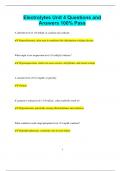
Electrolytes Unit 4 Questions and Answers 100% Pass
Electrolytes Unit 4 Questions and Answers 100% Pass A chloride level of 110 mEq/L in a patient may indicate: Hyperchloremia, often seen in conditions like dehydration or kidney disease What might a low magnesium level (1.0 mEq/L) indicate? Hypomagnesemia, which can cause seizures, arrhythmias, and muscle cramps A calcium level of 10.2 mg/dL is typically: Normal If a patient’s sodium level is 150 mEq/L, what could this result in? Hypernatremia, potentially causing fluid i...
- Package deal
- Exam (elaborations)
- • 15 pages •
Electrolytes Unit 4 Questions and Answers 100% Pass A chloride level of 110 mEq/L in a patient may indicate: Hyperchloremia, often seen in conditions like dehydration or kidney disease What might a low magnesium level (1.0 mEq/L) indicate? Hypomagnesemia, which can cause seizures, arrhythmias, and muscle cramps A calcium level of 10.2 mg/dL is typically: Normal If a patient’s sodium level is 150 mEq/L, what could this result in? Hypernatremia, potentially causing fluid i...
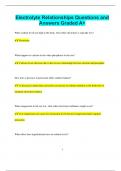
Electrolyte Relationships Questions and Answers Graded A+
Electrolyte Relationships Questions and Answers Graded A+ When sodium levels are high in the body, what other electrolyte is typically low? Potassium What happens to calcium levels when phosphorus levels rise? Calcium levels decrease due to the inverse relationship between calcium and phosphate How does a decrease in potassium affect sodium balance? A decrease in potassium can lead to an increase in sodium retention as the body tries to maintain electrolyte balance When mag...
- Exam (elaborations)
- • 9 pages •
Electrolyte Relationships Questions and Answers Graded A+ When sodium levels are high in the body, what other electrolyte is typically low? Potassium What happens to calcium levels when phosphorus levels rise? Calcium levels decrease due to the inverse relationship between calcium and phosphate How does a decrease in potassium affect sodium balance? A decrease in potassium can lead to an increase in sodium retention as the body tries to maintain electrolyte balance When mag...
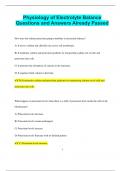
Physiology of Electrolyte Balance Questions and Answers Already Passed
Physiology of Electrolyte Balance Questions and Answers Already Passed How does the sodium-potassium pump contribute to electrolyte balance? A) It moves sodium and chloride ions across cell membranes. B) It maintains sodium and potassium gradients by transporting sodium out of cells and potassium into cells. C) It promotes the absorption of calcium in the intestines. D) It regulates fluid volume in the body. B) It maintains sodium and potassium gradients by transporting sodium out of ...
- Package deal
- Exam (elaborations)
- • 30 pages •
Physiology of Electrolyte Balance Questions and Answers Already Passed How does the sodium-potassium pump contribute to electrolyte balance? A) It moves sodium and chloride ions across cell membranes. B) It maintains sodium and potassium gradients by transporting sodium out of cells and potassium into cells. C) It promotes the absorption of calcium in the intestines. D) It regulates fluid volume in the body. B) It maintains sodium and potassium gradients by transporting sodium out of ...
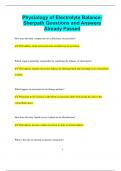
Physiology of Electrolyte Balance- Sherpath Questions and Answers Already Passed
Physiology of Electrolyte Balance- Sherpath Questions and Answers Already Passed How does the body compensate for a deficiency in potassium? The kidneys retain more potassium and decrease its excretion. Which organ is primarily responsible for regulating the balance of electrolytes? The kidneys regulate electrolyte balance by filtering blood and excreting excess electrolytes in urine. What happens to potassium levels during acidosis? Potassium levels increase in the blood as ...
- Package deal
- Exam (elaborations)
- • 12 pages •
Physiology of Electrolyte Balance- Sherpath Questions and Answers Already Passed How does the body compensate for a deficiency in potassium? The kidneys retain more potassium and decrease its excretion. Which organ is primarily responsible for regulating the balance of electrolytes? The kidneys regulate electrolyte balance by filtering blood and excreting excess electrolytes in urine. What happens to potassium levels during acidosis? Potassium levels increase in the blood as ...
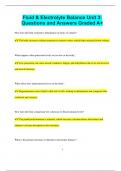
Fluid & Electrolyte Balance Unit 3: Questions and Answers Graded A+
Fluid & Electrolyte Balance Unit 3: Questions and Answers Graded A+ How does the body respond to dehydration in terms of sodium? The body increases sodium retention to conserve water, which helps maintain blood volume. What happens when potassium levels are too low in the body? Low potassium can cause muscle weakness, fatigue, and arrhythmias due to its role in nerve and muscle function. What effect does hypernatremia have on the body? Hypernatremia causes fluid to shift out of ...
- Package deal
- Exam (elaborations)
- • 72 pages •
Fluid & Electrolyte Balance Unit 3: Questions and Answers Graded A+ How does the body respond to dehydration in terms of sodium? The body increases sodium retention to conserve water, which helps maintain blood volume. What happens when potassium levels are too low in the body? Low potassium can cause muscle weakness, fatigue, and arrhythmias due to its role in nerve and muscle function. What effect does hypernatremia have on the body? Hypernatremia causes fluid to shift out of ...

BIOL-1033 Exam 4 Questions and Answers Already Passed
BRCC Exam 2 Bio 1013 Questions and Answers 100% Pass
NIC Esthetics Practice Test Questions and Answers 100% Pass
Cosmetology Clinical exam Questions and Answers 100% Pass
D440 Health and Wellness EAQ Questions and Answers Graded A+